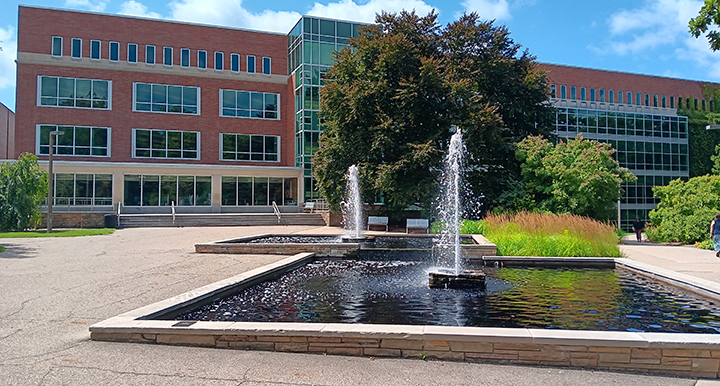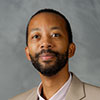Typically the DLF Forum occurs in the Fall. With the exception of the 2019 event in Tampa, I’ve had the pleasure of attending every Forum since 2017. This includes the two virtual Forums that occurred during the Covid-19 pandemic in 2020 and 2021.
The pandemic has significantly transformed how the conference’s planning committee undertakes this event, with new expectations around health, accessibility, affordability, and sustainability. The result led to a different approach for 2024—piloting a hybrid conference model. This includes the in-person event held this past July 29-31, and the upcoming virtual sessions later in the Fall from October 22-23.
The in-person event was held on the campus of Michigan State University in East Lansing. Prior to the July in-person event, I served as one of the proposal reviewers for the sessions that were ultimately chosen for the conference.
The main programming kicked off with the opening plenary, featuring the keynote address by Kathleen Fitzpatrick, Interim Associate Dean for Research and Graduate Studies in the College of Arts & Letters at Michigan State. She also leads the Knowledge Commons project, an open-access, open-source network that supports over 40,000 scholars and practitioners worldwide. Additionally, she is the current president of the board of directors at the Educopia Institute.
In her keynote, Fitzpatrick focused on how technology systems can impact fairness and inclusion in scholarly communication. She pointed out that while open access publishing has made more research available online, it has also created new challenges, such as high costs that prevent scholars from less wealthy institutions or countries from participating fully.
Fitzpatrick also discussed the difficulties in maintaining open platforms, especially given the dependence on big companies like Amazon Web Services (AWS) for hosting. She expressed concerns about whether the values of these tech giants align with the goals of academic projects.
She wrapped up her talk by encouraging everyone to join in conversations about the future of digital libraries, open access, and how technology can be used to promote fairness and justice.
The opening and closing plenary was held in Wells Hall. All of the sessions occurred in the campus’s main library, which is about a 5 minute walk from Wells Hall.

The first presentation I attended was “Using AI With Manuscript Collections For Librarians And Scholars” by Sonia Yaco, the Digital Initiatives Librarian at Rutgers University. The presentation highlighted several AI tools that are particularly useful for managing and enhancing access to manuscript collections. These include ChatGPT, and DALL-E, an AI that creates images based on text descriptions. Google Lens was mentioned for its ability to recognize and analyze both text and images. She also pointed out the use of the Google Translate API for translating text between languages. Additionally, Jupyter Notebook and Python were noted for their roles in data analysis and implementing AI models.
I also attended another AI themed presentation, “Whispers in the Audio Files: Building an AI-assisted transcription workflow”, by Cassondra Darling and Barbara Laufersweiler from the University of Oklahoma Libraries. They detailed their efforts to transcribe 600 audio recordings from the Doris Duke Native American Oral History Project within a 12-month deadline with the help of student workers.
To meet this challenge, they implemented Whisper AI for speech-to-text conversion. The workflow they developed involved running the audio files through Whisper AI and then having student workers edit and finalize the transcripts. The project faced several challenges, such as adapting to ongoing AI updates, managing an expanding team, and ensuring the quality of the transcripts. Despite these hurdles, the team succeeded in producing accurate transcripts and continuously improving their workflow.
Another notable session I attended was a hands-on workshop, “The Wiki-vengers Initiative: a comics Wikidata workshop”, led by Kate Topham, the Digital Humanities Archivist at Michigan State. The workshop focused on improving the metadata of Michigan State’s huge comic book collection through the use of Wikidata. This is actually an ongoing project to convert 50,000 MARC records into a more accessible format. Fun fact, Michigan State has the largest comic book collection in the world (over 350,000).
The closing plenary featured Germaine Halua, who discussed the importance of digital equity in the context of emerging technologies (AI and machine learning). She emphasized the need for more equitable digital infrastructures and the role of libraries. Halua also introduced the concept of “reparative AI,” which focuses on using AI to address and resolve social inequities.
I’m looking forward to the virtual installment of the DLF Forum in the Fall.

11 Comments on ‘A DLF Forum in the Summer?’
Mel- thank you for this informative report on using AI and how it is being used on the cutting edge in academic libraries. Fascinating.
Thank you for sharing your experiences at the DLF Forum Mel!
Thanks Mel! I am curious (and optimistic) about the uses of AI for things like getting a first draft of a transcription from audio or manuscripts so I’m glad to see some real projects are working with it. Eventually a better understanding of what it can and can’t do will emerge!
Thanks for this informative post! It would seem the conference covered both the how and the why AI can be a helpful tool in digital humanities. I appreciate the highlights!
Thank you for posting about this conference, Mel. I’m glad that the issue of fairness and inclusion in scholarly communication, and the importance of digital equity as it relates to emerging technologies was addressed. These areas are growing rapidly, and identifying gaps early in the process, particularly those related to equity, is of paramount importance.
Thanks for the post, Mel! It’s good to see where AI is coming into play besides in license agreements for content!
Thanks Mel, for sharing about this–important digital food for thought!
Thanks for this summary — like other commenters, I welcome the prospect of AI aiding us with labor intensive library and archival work!
Thanks for sharing this, Mel! I want to check out that comic book collection!
Sounds like another excellent DLF. It’s going to be interesting to see if the hybrid format proves successful. It’s kinda fun that you essentially get two DLFs in a year!
The Wiki-data comic book project sounds so neat! Thanks for sharing, Mel, and congrats on a successful Program Committee experience – it’s always cool to see a presentation after reading the proposal!